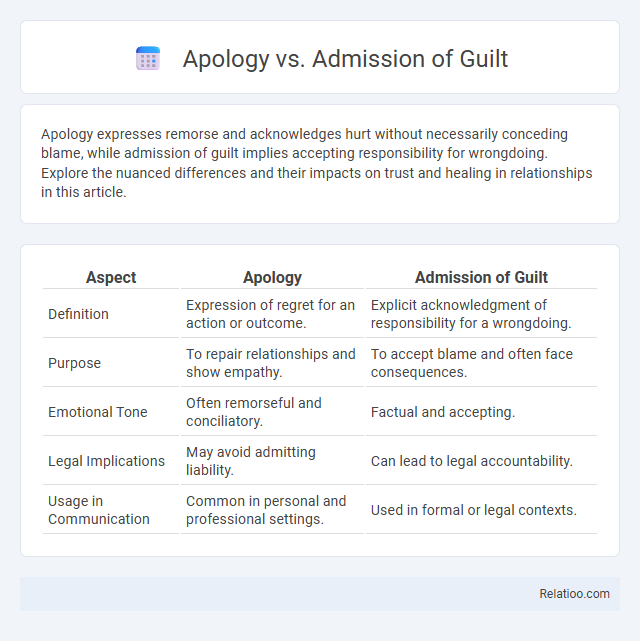Apology expresses remorse and acknowledges hurt without necessarily conceding blame, while admission of guilt implies accepting responsibility for wrongdoing. Explore the nuanced differences and their impacts on trust and healing in relationships in this article.
Table of Comparison
| Aspect | Apology | Admission of Guilt |
|---|---|---|
| Definition | Expression of regret for an action or outcome. | Explicit acknowledgment of responsibility for a wrongdoing. |
| Purpose | To repair relationships and show empathy. | To accept blame and often face consequences. |
| Emotional Tone | Often remorseful and conciliatory. | Factual and accepting. |
| Legal Implications | May avoid admitting liability. | Can lead to legal accountability. |
| Usage in Communication | Common in personal and professional settings. | Used in formal or legal contexts. |
Understanding Apology and Admission of Guilt
An apology is a statement expressing regret or sorrow for an action without necessarily acknowledging legal liability, while an admission of guilt explicitly recognizes responsibility for wrongdoing and can have legal implications. Understanding the distinction is crucial in contexts such as legal matters or conflict resolution, where an apology may serve to mend relationships whereas an admission of guilt might lead to legal consequences. Clear differentiation ensures appropriate responses in both personal and professional settings, balancing empathy with accountability.
Key Definitions: Apology vs Admission of Guilt
An apology expresses regret or sorrow for an action without necessarily accepting blame, serving as a gesture of goodwill or empathy. Admission of guilt explicitly acknowledges responsibility for wrongdoing, often implying consent to consequences or legal liability. Understanding the distinction between your apology and admission of guilt is crucial in contexts such as legal disputes, workplace conflicts, or personal relationships.
Psychological Motivations Behind Apologies
Apologies often serve as a social tool to repair relationships by acknowledging harm, whereas admissions of guilt explicitly accept responsibility, reflecting different psychological motivations such as empathy or self-preservation. An apology may be motivated by a desire to reduce interpersonal tension and foster forgiveness without necessarily conceding fault, contrasting with admissions of guilt that typically involve internal acknowledgment of wrongdoing and acceptance of consequence. Understanding these distinctions reveals how humans navigate accountability and social harmony through nuanced emotional and cognitive processes.
Legal Implications of Admitting Guilt
An apology expresses regret without necessarily admitting fault, whereas an admission of guilt explicitly acknowledges responsibility for an act, carrying significant legal consequences such as potential liability or criminal charges. Legal systems often distinguish between these terms to prevent apologies from being used as evidence of fault in court, protecting individuals from self-incrimination. Understanding the legal implications of admitting guilt is crucial, as it can impact litigation outcomes, insurance claims, and criminal proceedings.
How Apologies Impact Personal Relationships
Apologies foster trust and healing in personal relationships by acknowledging hurt feelings without necessarily admitting guilt, which helps maintain respect and openness. Distinguishing between an apology and an admission of guilt allows your relationships to grow through empathy and understanding rather than defensiveness. Offering a sincere apology can diffuse tension, repair emotional damage, and strengthen bonds while preserving each person's dignity.
The Role of Culture in Apologies and Admissions
Cultural norms significantly influence how apologies and admissions of guilt are perceived and expressed, with some societies prioritizing indirect communication to maintain harmony while others value direct acknowledgment of fault. Your approach to apologizing or admitting guilt should align with cultural expectations, as misunderstandings can arise when communication styles clash. Understanding the role of culture can help you navigate sensitive situations more effectively, fostering better relationships and clearer resolutions.
Benefits and Risks of Admitting Guilt
Admitting guilt can provide clarity and foster trust by showing accountability, which may lead to quicker dispute resolution and potential leniency in legal or professional contexts. However, Your acknowledgment of fault may also be used against You in lawsuits or damage reputations, increasing the risk of financial consequences and loss of credibility. Balancing the benefits of demonstrating responsibility with the risks of legal exposure is critical when considering an apology versus an admission of guilt.
Non-Apology Apologies: What Do They Mean?
Non-apology apologies often include phrases like "I'm sorry you feel that way," which avoid admitting fault and serve to deflect responsibility rather than offer a genuine apology. Understanding the distinction between a sincere apology and an admission of guilt is crucial because your response can influence conflict resolution and legal liability. Recognizing these nuances helps you navigate interactions effectively and clarify whether an apology implies acknowledgment of wrongdoing or simply empathy.
Practical Tips for Issuing Genuine Apologies
Issuing a genuine apology requires clearly distinguishing between an apology and an admission of guilt to avoid legal or personal repercussions. Effective apologies emphasize empathy, acknowledge the impact of actions without necessarily accepting liability, and express sincere remorse to rebuild trust. Focus on clear communication, responsiveness to the offended party's emotions, and offering concrete steps for remedy or reconciliation to ensure authenticity in the apology.
Navigating Public Apologies and Crisis Management
Navigating public apologies requires understanding the key distinction between an apology and an admission of guilt, as your statement can impact legal liability and public perception. An apology expresses regret and empathy without necessarily accepting fault, while an admission of guilt confirms responsibility and may have legal repercussions. Effective crisis management balances sincere communication with strategic phrasing to maintain trust and minimize damage to your reputation.

Infographic: Apology vs Admission of Guilt
 relatioo.com
relatioo.com